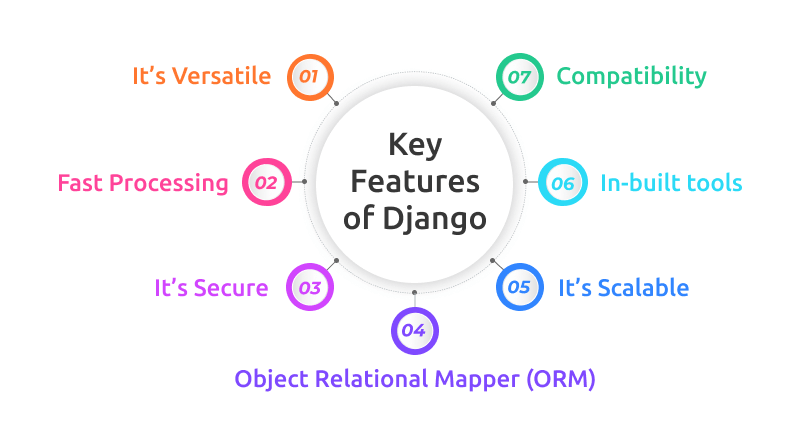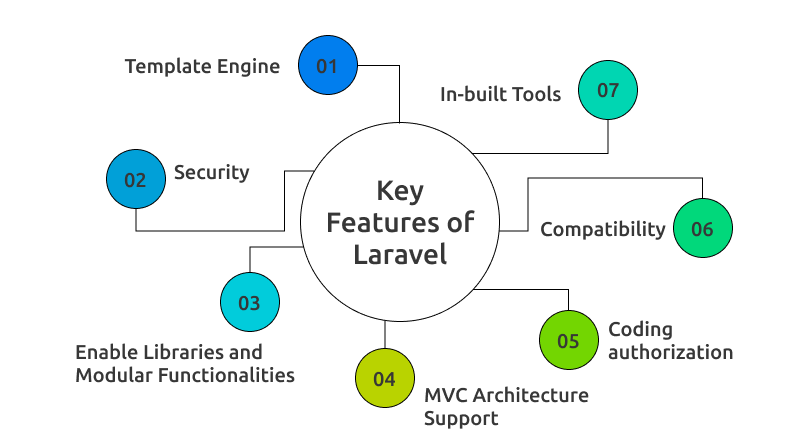Despite the increasing popularity and growing demand for dynamic development, website development is receiving substantial recognition with quickly evolving technological advancements. In the web development sector, Django and Laravel are the two most preferred back-end development technologies.
Django framework is a Python-based web framework to develop applications hassle-free. It was invented in 2003 to meet the demands of web developers and shorter deadlines for the newspaper website. The term Django is coined by the famous Belgian guitarist Django Reinhardt. Laravel, on the other hand, is a popular PHP framework used to build websites and applications. Taylor Otwell created Laravel in 2011 to build web projects following Model-View-Controller (MVC).
The Django framework follows Model View Template (MVT) for web designing, which makes it a preferred choice for complicated web applications. Therefore, the Django hosting platform provides a robust infrastructure to make Django applications compatible with it.
PHP is a computer language that is used to build websites and therefore Laravel is one of the best frameworks for it. However, Laravel is a popular software for building websites and applications. And it requires Laravel hosting plans to scale web projects worldwide. The developer’s community will have a debate over which is better, Django vs. Laravel. We have brought this blog highlighting the key differences between them for their convenience.
Table of Content
What is Django?
Django is a Python-based web framework released in 2005. Django Software Foundation developed this framework. It includes developing-rich applications with the battery included. There is an MVT architecture for rapid web development. Different tech giants like Mozilla, Instagram, Bitbucket, Pinterest, etc., use Django framework
Django frameworks include the built-in database support SQLite, making the development process faster. It is optional to spend too much time and effort with this framework. Now, what makes this framework special? Here are some notable features to look for.
Key Features of Django

1. It’s Versatile
Django is useful for building any website. It efficiently supports client-side systems and provides content in any organization, including HTML, RSS bolsters, JSON and XML.
2. Fast Processing
One major advantage over frameworks is that they give a distinctive architecture to process applications fast. It deploys MVT architecture making the entire process of transmitting over the Internet quicker and excellent.
3. It’s Secure
You need the query what Django Python is and whether it is secured. This framework has built-in security measures and libraries to protect your applications against general threats. Therefore, engineers have a secure way that oversees user accounts and passwords. And to avoid common mistakes like putting session data in cookies is possible to prohibit in Django.
Related: Top 9 Mistakes That Django Developers Make
4. It’s Scalable
The Django framework is easy to scale because each design part is free. Developers, if want to make any changes in the same, it is possible to do so. Adding equipment at any level of complexity: caching servers, database servers, or application servers, implies that it can scale for expanded activity. Django scales effectively to meet the demands of the busiest applications.
5. Object Relational Mapper (ORM)
Because of excellent engineering brains, Django founders have created the ORM feature. It allows developers to interact with the database, and all thing is required to have basic SQL expertise.
6. In-built tools
There are several in-built tools in the Django framework, like algorithm-based generators, dashboards for admins, investment fund management interfaces, tools for data analytics and many more. All these tools help in minimizing the web project development time. Moreover, it helps developers write the best code, encouraging them to follow industry standards.
7. Compatibility
Django is compatible with different frameworks and architectures of microservices, and it is versatile and easy to develop web projects on the same. Moreover, it has built-in security that secures and quickly breaks Django projects into smaller microservices, making it easy to scale. Apart from this, the support of multilingual professionals makes it compatible with different websites.
What is Laravel?
This CMS can be developed in a radically reduced amount of time with Laravel, created by Taylor Otwell in 2011. It is known for its superior framework and other in-built features; it makes developers’ lives easier.
Key Features of Laravel

1. Template Engine
Laravel uses dynamic content seeding to build lightweight layout themes and templates. Also, it gives a rigid structure to several widgets joining CSS and JS code.
2. MVC Architecture Support
Laravel supports the MVC architecture that gives separate business logic and presentation layers. This framework has built-in functions that enhance performance or security while optimizing the application’s adaptability.
3. Security
Laravel provides robust web application security features such as hashed and salted password components, preventing plain text password storage in databases. The framework also employs the secure “Bcrypt Hashing Algorithm” for encrypted password creation and has measures to prevent SQL injection attacks.
4. Coding authorization
In terms of coding authorization, Laravel follows a consistent methodology that eliminates inconsistent or unassignable values in code variables.
5. Enable Libraries and Modular Functionalities
Eloquent, the object relational mapper used by Laravel, offers a straightforward PHP Active Record implementation that allows developers to write database queries in PHP syntax instead of SQL code. This approach is faster than traditional PHP systems.
6. In-built Tools
Laravel also has pre-installed Object-Oriented and Modular libraries, including a comprehensive Authentication library with multiple functions. Additionally, the framework includes built-in tools such as Laravel Debugbar, IDE Helper, Laravel Tinker, and Laravel Socialite that work seamlessly together to streamline application development for beginners and experienced developers alike.
Related: Can Laravel Run On Shared Hosting?
7. Compatibility
Artisan, Laravel’s command-line interface, generates code with standardized naming conventions, namespaces, and boilerplate code already configured. Creating custom code generators is also straightforward with Laravel. Overall, Laravel offers a high level of compatibility and a range of features to improve the efficiency and security of web application development.
Django vs. Laravel: Basic Comparison
| Django | Laravel | |
| Definition | Free, open-source, and Python-based web framework. | Free, open-source, and PHP-based web framework. |
| Platform | Cross-platform web frameworks that support various OSs. | Cross-platform web frameworks that support multiple OSs. |
| Maintenance | It is backed by the DSF, i.e., the Django software foundation. | It is maintained by the developer itself. |
| Front-end support | Somewhat hard to connect with a front-end JavaScript framework. | Fully support Vue.JS without requiring extra configuration. |
| Popularity | It is a top-notch web framework commonly used around the world. Different categories of websites can be developed on Django. | It is also an extensively used framework in Brazil, China, the UK, and other 157 countries. |
Django vs. Laravel Performance: Important Differences
Let’s have a look at the important Django vs. Laravel performance differences depending on various aspects.
| Various Criterions | Django | Laravel |
| Programming Languages Supported | It is written in the Python language. | It is written in PHP. |
| Code | Compared to Laravel, its code is slightly complex. | Its code isn’t as complex as Django. |
| Scalability | It can efficiently manage heavy traffic and works effectively with different technologies. | Several well-known projects have been built upon Laravel. Its applications provide unrestricted scalability. |
| Architecture | Supports MVT, i.e., model view template model. | Supports MVC, i.e., model view controller model. |
| Generality | It offers faster web development features that automatize the necessary processes. | It is built upon an effective architecture with a growing user community. |
| Development Environment | It offers a lightweight web server with quicker and simpler web development. | It is comprised of queues and events and a command bus that is useful in executing the cron jobs. |
| Compatibility | A number of other frameworks do exist for Python. | For it, PHP is the only framework. |
| Performance | It is a lot faster than Laravel. | It is significantly behind in speed. |
| Security | Django applies some of the advanced safety features that help in preventing common web development mistakes. | Laravel offers basic safety features that fall short of Django’s security level. |
| API | Doesn’t provide in-built support for API. | Provides API support by default. |
Other Differences Based on Django vs. Laravel Performance Benchmark
- While analysing the Laravel vs. Django performance, it is crucial to note that Django has won 43,384 GitHub stars, while Laravel has earned 34,329 stars.
- 205,106 websites are running in Django, whereas 121,173 websites have been hosted by Laravel.
- Django offers greater safety measures for business applications, whereas Laravel offers the basic safety measures.
- Django offers middleware support, whereas Laravel offers only HTTP middleware support.
- Django provides a wide range of useful features, such as decorators, third-party libraries, and SEO tools. Whereas Laravel provides method injection.
- Django offers a default administrative interface; on the other hand, the powerful authentication and templating engine provided by Laravel is utilized for designing dynamic web pages.
Django and Laravel are both of good frameworks for developing an application to create. The major differences in both web application’s frameworks is the supporting language. If Laravel is supported by PHP language, Django is compatible with Python. Hence, there will be differences in their libraries and basic features.
Whichever framework you choose, there will be a requirement of web hosting infrastructure. Laravel hosting and Django hosting. MilesWeb is the leading web hosting firm that gives reliable hosting infrastructure to boost the online credibility of sites. There are some additional features like 24×7 support, SSD NVMe storage, an Indian data center and 99.95% uptime.
FAQs
Django vs. Laravel: which framework offers better performance?
Django gains the upper hand in providing better performance in terms of speed, support, and scalability compared to Laravel. However, the top choice relies on your web project’s requirements.
Which framework is difficult for newcomers to learn, Django or Laravel?
Compared to Laravel, Django has a difficult learning curve because it makes use of regular expressions within the routing process, which is difficult to use for beginners.
Which framework is better suited for rapid prototyping, Django or Laravel?
Django’s simplified web development process quickly turns ideas into functional prototypes, offering rapid prototyping compared to Laravel.
Which framework is better suited for enterprise-level applications, Django or Laravel?
If you compare Django vs. Laravel speed, Django is better suited for enterprise-level applications due to its best security practices, flexibility, and scalability.
Which framework offers better documentation and community support, Django or Laravel?
Django and Laravel both provide massive documentation, which is easily accessible to newcomers. But having said that, Django’s simple and easy syntax, together with Python’s ease of understanding, makes it more easy to learn.















